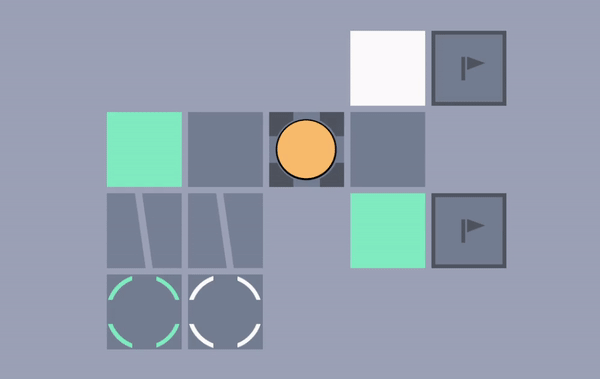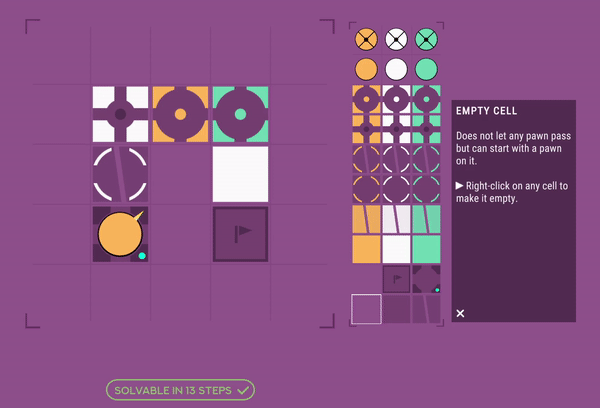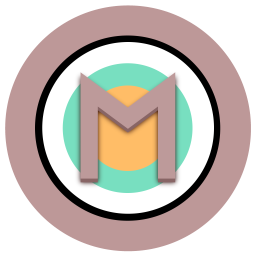Minimal Crypt is a minimalistic puzzle game with a steep difficulty curve. Packed with 60+ handcrafted levels, it uses no more than 25 tiles to make for really tough logic puzzles.
Move your pawns around a grid, acquire colored coatings that allow one pass through a colored block each, and take care of their order because they will be consumed in reverse! Double inversions, out-of-the-box thinking, logical deduction: those are the skills the game is testing.
The project
Started during lockdown in 2020, it was released exactly one year after, in October 2021. It was made by a very small team:
- Dionisos, developer and level-designer,
- Sebastien Maillot, music composer and musician,
- Me, as lead developer, game and level designer.
The main objective was to succefully ship a game we would be proud of, and by that I mean actually ship a game. It has always been a struggle to find the balance between achievable scope and pleasing ambition: we see Minimal Crypt as our first answer to that struggle.
To succeed, we started with a very simple, yet central, idea: keep things small. And I must say, even though we did seriously bad on the marketing side, generating around 300 sales while writing this, the game feels like a real success on the reviews side:
“Minimal Crypt proves that good things come in small packages!”
Beta Tested, Game Reviewed
“A wonderful Steam debut for a puzzle creator that still managed to bring something fresh for the player base.”
I DO MY BEST
“Puzzle games with genuinely innovative mechanics are incredibly rare these days and this little gem in the rough is a perfect example of something brand new that\'s easy to pick up but incredibly hard to master.”
TwistedBOLT
Minimalism
The central idea - that finds a place in the name of the game itself - was minimalism:
- Focus on the core,
- Think small, and iterate fast,
- Constraint the creative process,
- Rely on skills we had or could quickly master.

This simple principle surprinsgly brought us further than in any other game project we had and it is a real pride to be able to say today: did you know we released a game on Steam?
I also believe this is what brought us to release a game that is clean even though we were not professionnals, because we deliberately reduced the number of things we should care about. This way, we could really care about the important ones.
We were not confident enough in our art skills? We removed illustration from the game completely. Not really inspired with a nice story to tell or fantasy to set the game in? Remove that too, keep things purely puzzle-centered.
This also led to very interesting game-design ideas and moments in the making of the game. Having such a constraint even on the size of levels themselves (only 5x5 grid, never more) was sometimes really frustrating when designing levels, but it almost always led to interesting levels that incorporated complex ideas in very simple layouts. The actual difficulty would sometimes actually come from the apparent simplicity.
Opening the tools to the public
We had so much fun designing the levels that we actually decided to push things a little bit and release the tools to the public, directly inside the game. We incorporated a level editor, as well as one of our main assistant in making the game: an AI-solver.

This is what\'s cool when you are a bunch of geeks working on a purely logical puzzle: you know about A* algorithm and you can use it. This way, we could iterate very fast, and most of all it made something really crazy happen:
Us, or players later on, would design a little puzzle without thinking too much. We would add a tile here, change a color there, and slowly see the minimum number of moves required to solve the puzzle increase. A small change could increase the shortest solution by ten moves sometimes!
And then, we would hit play. And we would have no idea how the hell we would solve the thing that we just created. I saw a player spend 1h30 on a puzzle they just made in less than 10 minutes. This is the main reason why we released the level editor: part of the fun we had making the game was actually playing it, and this is not something you can say of all puzzle games.
